Introduction
In today's competitive e-commerce landscape, product customization has emerged as a powerful tool for brands looking to distinguish themselves and foster deeper connections with their customers. Offering tailored products not only enhances customer satisfaction and loyalty but also allows brands to command premium prices, boosting profitability. As personalization becomes an increasingly pivotal trend, understanding and effectively targeting the right audience is crucial for successful customization.
This article delves into the multifaceted benefits of product customization, outlining strategies for understanding target audiences, implementing effective customization processes, and leveraging data to create personalized experiences. It also explores how technology can scale customization efforts and the importance of continuous testing and refinement to stay aligned with customer expectations. By adopting these practices, brands can build lasting customer loyalty and secure a competitive edge in the ever-evolving market.
Benefits of Product Customization
Product customization offers a multitude of advantages for e-commerce brands. It significantly enhances consumer satisfaction by allowing individuals to tailor products to their specific preferences, which leads to higher engagement and loyalty. Personalization creates a unique and memorable shopping experience, much like a savvy shop assistant who knows exactly what you want, making shoppers feel valued and understood. This level of connection is crucial in today's crowded marketplace where standing out is more challenging than ever.
Moreover, customized products often command premium prices, thereby boosting profitability. The demand for personalized goods is growing, with Forbes listing it as one of the ten biggest business trends for 2024. As consumers become more selective about their purchases, offering bespoke products can provide a competitive edge. The success of personalization isn't solely focused on the individual sale; it's about nurturing deeper relationships with clients, leading to repeat purchases and favorable word-of-mouth.
In the digital age, the power of personalization is paramount. As stated in a Gartner report, fostering an environment focused on the client is crucial for establishing authentic connections. Businesses that excel in personalization, like Spotify with its curated playlists, demonstrate the value of understanding and catering to individual preferences. This approach not only improves the experience of clients but also creates a competitive barrier that is difficult to duplicate, ensuring long-term success and loyalty.
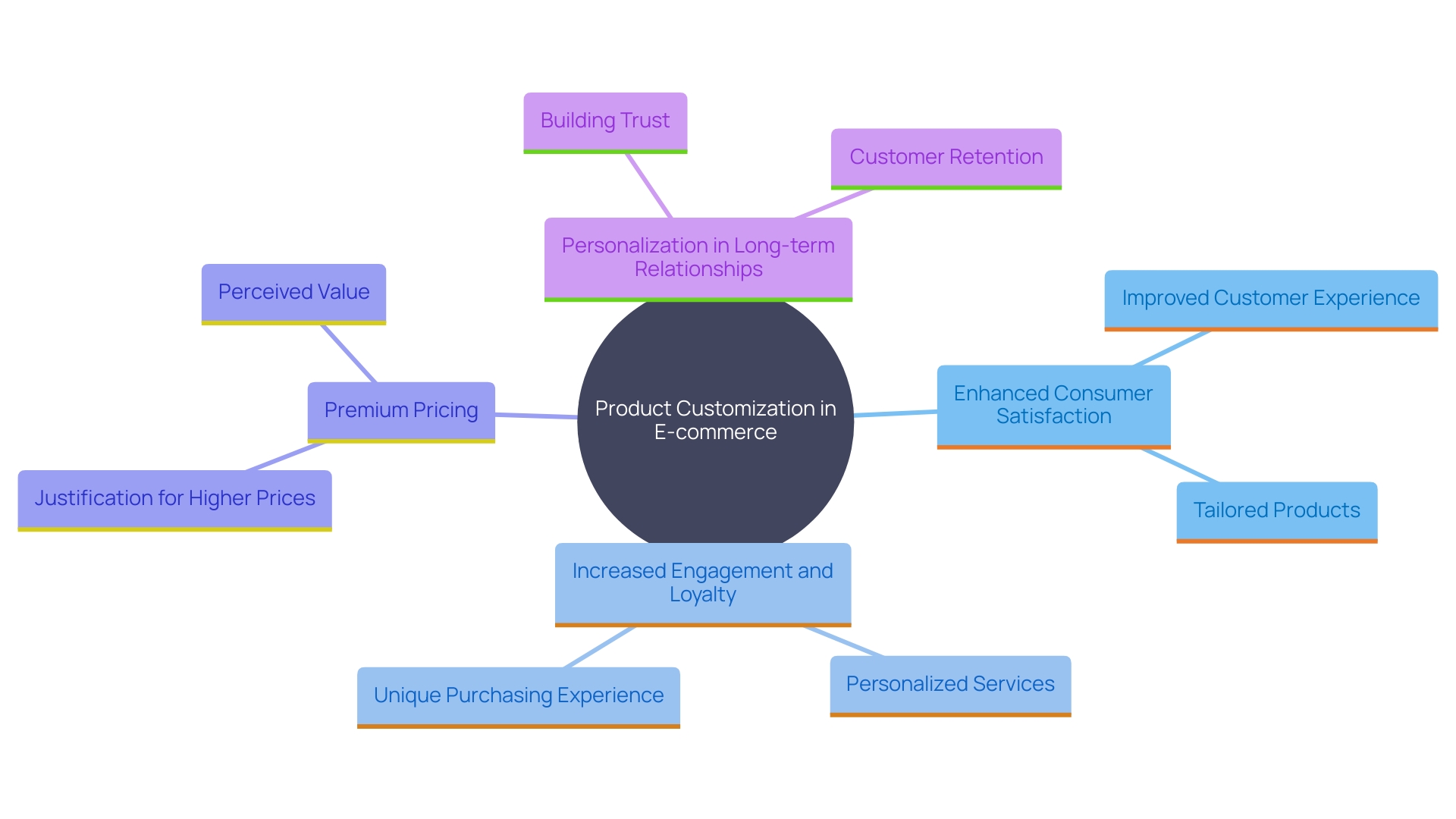
Understanding Your Target Audience for Effective Customization
To successfully implement product customization, brands must begin by deeply understanding their target audience. This understanding is built through comprehensive market research that employs both qualitative and quantitative methods. Surveys and focus groups can uncover consumer preferences and pain points, revealing what features are most desired. For instance, primary research enables businesses to collect firsthand information on competitors' strengths, weaknesses, and unique selling points, providing a thorough understanding of the competitive landscape.
Demographic data analysis is crucial for identifying key consumer segments that value customization. By using segmentation studies, brands can effectively categorize their markets and select the best target segments. This process involves blueprinting sessions to gather stakeholder information, ensuring the results are actionable. Furthermore, employing the right analytical tools and creating a robust typing tool are essential steps in this process.
Interacting with clients through social media or feedback forms offers extra insights into preferred features. Ethnographic research, such as observing individuals in their natural environments, can also be invaluable. For example, watching how customers engage with items in their residences can reveal usability problems that may not be obvious through information alone.
Integrating AI into market research can simplify information gathering and analysis. AI enables businesses to distill extensive data into concise, actionable insights, helping make informed decisions tailored to specific requirements. 'This method not only improves the effectiveness of secondary research but also guarantees that the tailoring process aligns with the precise requirements and wishes of the target audience.'.
By tailoring the customization process to these insights, brands can create a more meaningful and personalized shopping experience. This level of personalization has been shown to significantly impact client satisfaction and loyalty, as highlighted in various industry reports. For example, a Gartner® report underscores the power of personalization in digital commerce, emphasizing that creating a genuine connection with customers starts with understanding their unique preferences and behaviors.
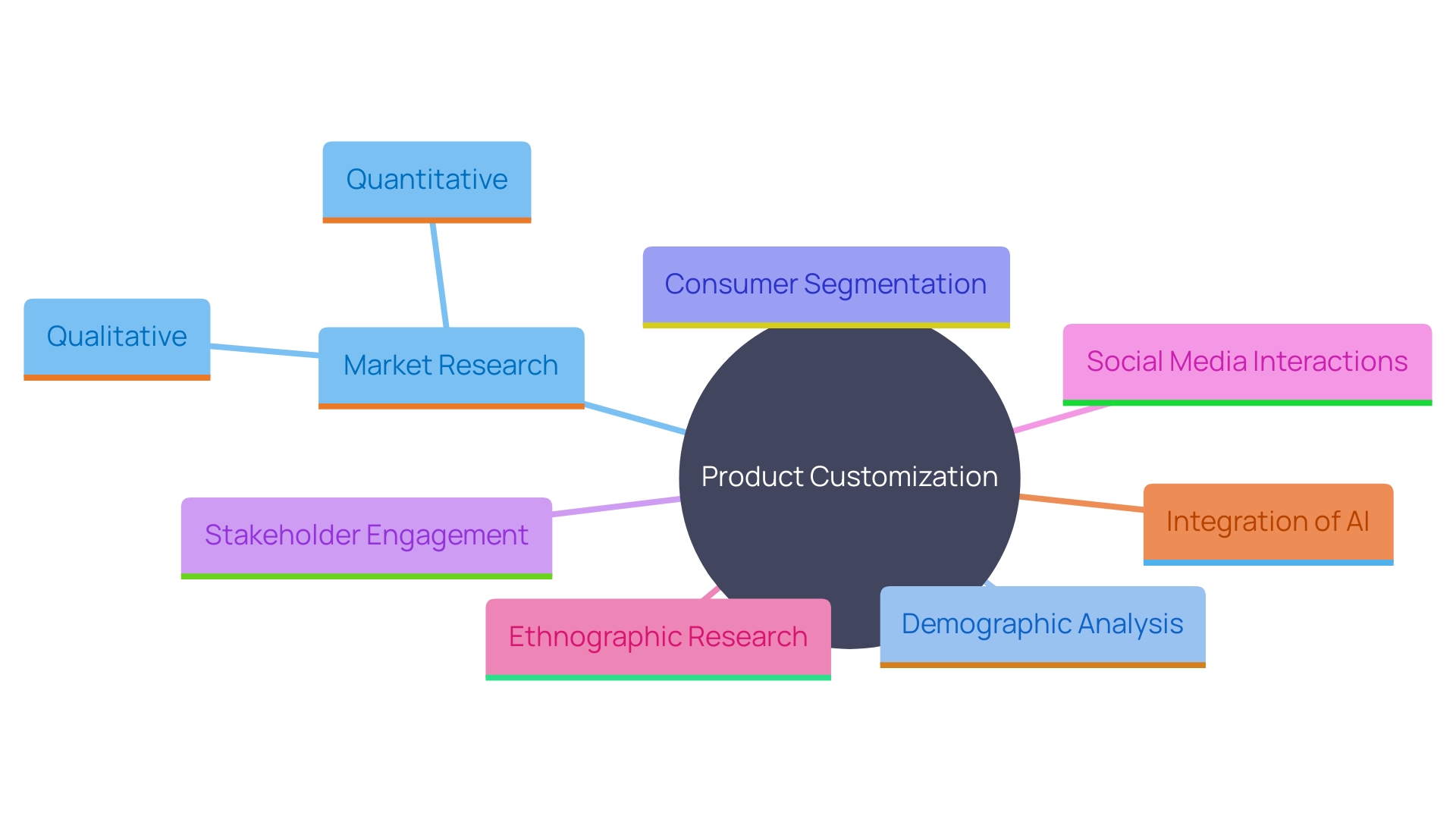
Strategies for Implementing Product Customization
Implementing product personalization requires a strategic, customer-centric approach. Brands should start by clearly outlining the personalization parameters—detailing which aspects of the product can be tailored and how. A user-friendly and visually appealing layout is crucial, allowing clients to effortlessly explore the personalization choices. For instance, Nets, a provider of digital payment solutions, successfully transformed complex technical data into engaging formats, making it easier for users to interact with their offerings. This same principle applies to product customization; simplifying the process can significantly enhance user satisfaction.
Delivering a smooth end-to-end process, from product selection to checkout, is crucial. Inspiration can be drawn from MediaMarkt's flagship stores, which integrate technology and innovation to create inspiring and surprising shopping encounters. Brands can also provide visual representations of tailored products, assisting buyers in imagining their unique creations. Utilizing AI and machine learning algorithms can further enhance personalization, as highlighted in a Gartner report on digital commerce. Frequent enhancements to personalization choices informed by trends and client input will guarantee that products stay innovative and captivating, similar to how Dublin Town To Go store incorporates the newest Zippin technology for a checkout-free shopping process.
Statistics show that personalization and innovative shopping experiences are driving the e-commerce market forward. With US retail e-commerce sales reaching $579 billion in the first half of 2024, and predictions estimating sales to hit $1.26 trillion by year's end, it's evident that staying ahead with personalized options is not just beneficial but essential.
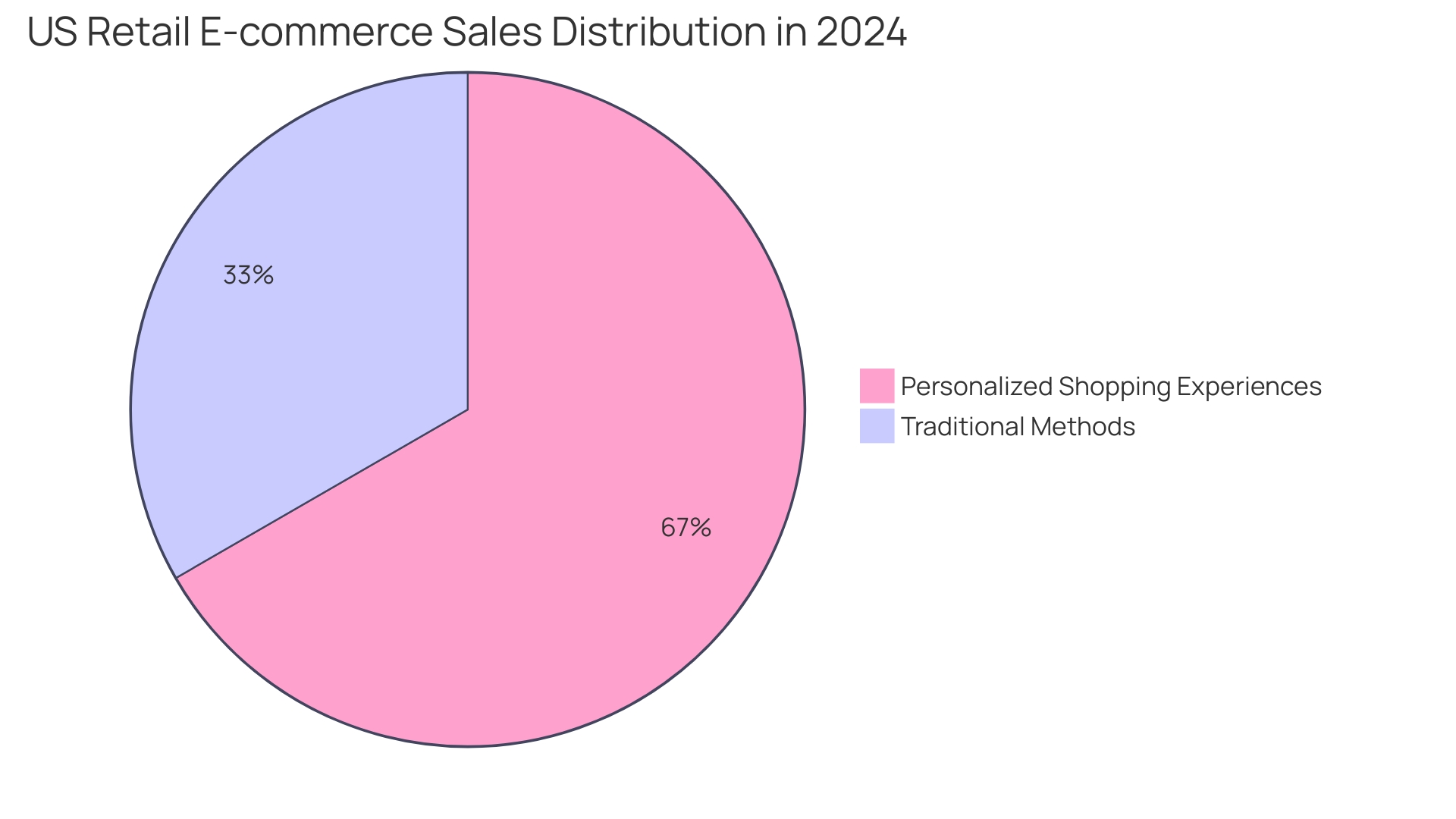
Leveraging Data for Personalized Experiences
'Information analysis is a fundamental element in the area of product tailoring, allowing brands to utilize consumer information for meaningful personalization.'. By utilizing advanced tools such as AI and machine learning, brands can anticipate client preferences with remarkable accuracy, thereby streamlining the customization process. For instance, analytics allows e-commerce retailers to examine customer touchpoints—from advertisements to purchase reviews—creating a comprehensive customer persona. This data-driven approach not only enhances the user experience but also significantly reduces costs through strategic targeting.
A 2021 report highlights the significance of information, predicting that by 2025, it will support nearly all business functions. Companies adopting data-driven strategies are expected to gain a competitive edge, with smart workflows becoming standard. Enterprises must identify and use the right data toolsets to train AI models effectively, ensuring reliable outcomes.
Examining past transactions and shopping habits enables companies to propose pertinent personalization choices, enhancing the purchasing process to be more intuitive. Implementing A/B testing further refines these features, ensuring they align closely with client expectations. As technology develops, user experience stays crucial, with information science propelling this change. Companies concentrating on personalized client strategies have experienced a 23% rise in new client acquisition, emphasizing the vital role of data in contemporary e-commerce.
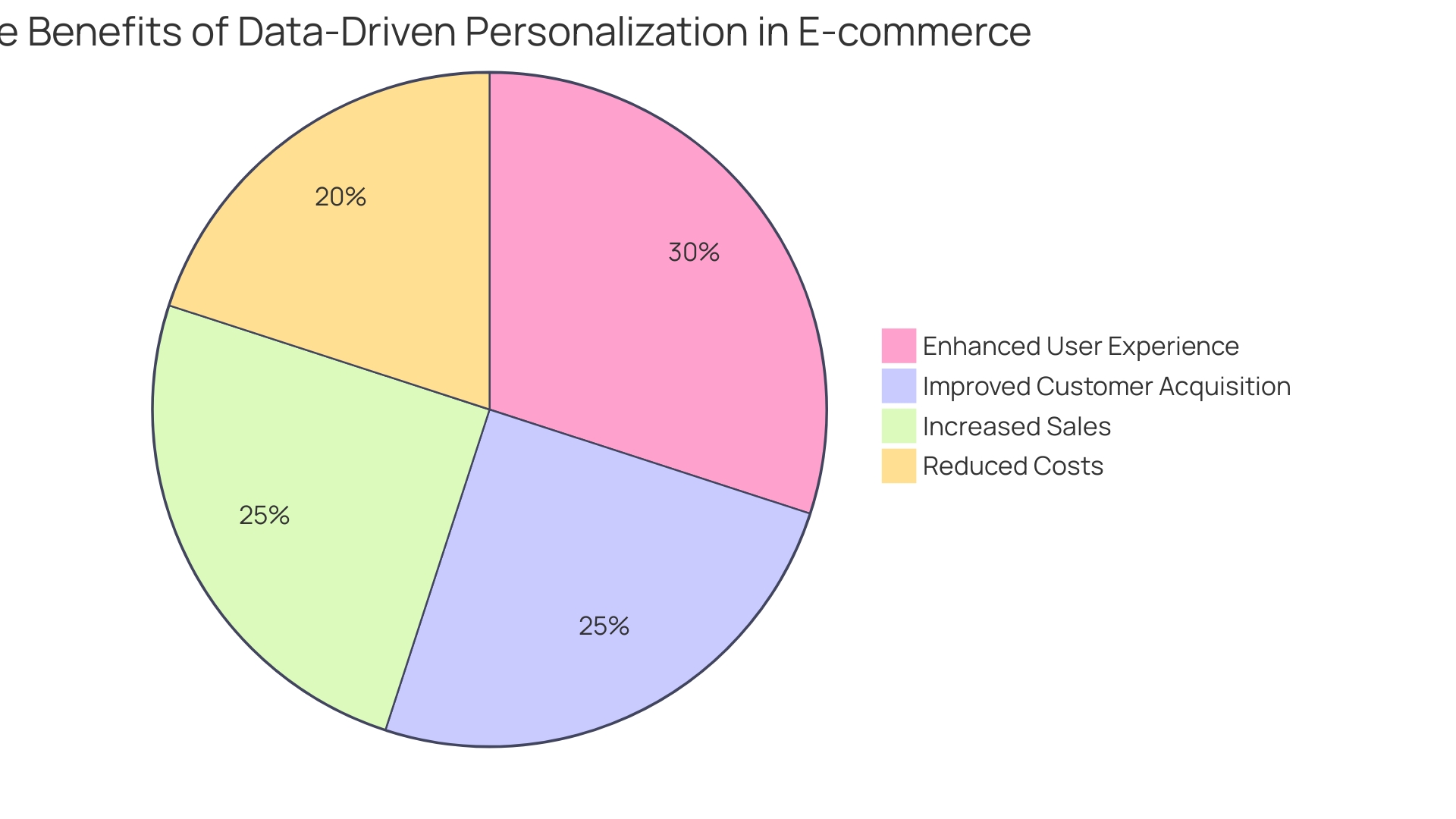
Building Brand Loyalty through Customization
Customization is a formidable strategy for building brand loyalty. When customers feel that a brand understands their individual needs, they are much more likely to return. According to recent studies, 61% of consumers are willing to spend more with companies that provide a personalized service. However, only 23% of consumers report experiencing high levels of personalization after recent hotel stays, and just 26% say the same after recent retail interactions. This presents a significant opportunity for improvement.
Offering exclusive customization options or loyalty programs that reward personalized experiences can incentivize repeat purchases. In the grocery retail sector, personalized offers and members-only pricing have proven to be highly effective in maintaining and increasing client loyalty. In fact, 70% of retailers have successfully maintained and even increased their base of loyal patrons in recent years, with 53% seeing an increase in loyalty scheme uptake.
Engaging clients through personalized marketing campaigns that highlight their customized products can further strengthen the connection. Research shows that customers who rate the level of personalization they received as very high are also far more likely to report high overall satisfaction. Building a community centered on personalization fosters a sense of belonging, which is essential for encouraging long-term loyalty.
As Andrew Custage, Head of Insights for Medallia Market Research, observes, 'It’s no surprise to see the clear link between personalization and satisfaction, but also not surprising to see brands struggling to keep up with consumer expectations for more individualization.' This highlights the significance of consistently adapting and improving personalization efforts to meet and exceed client expectations.
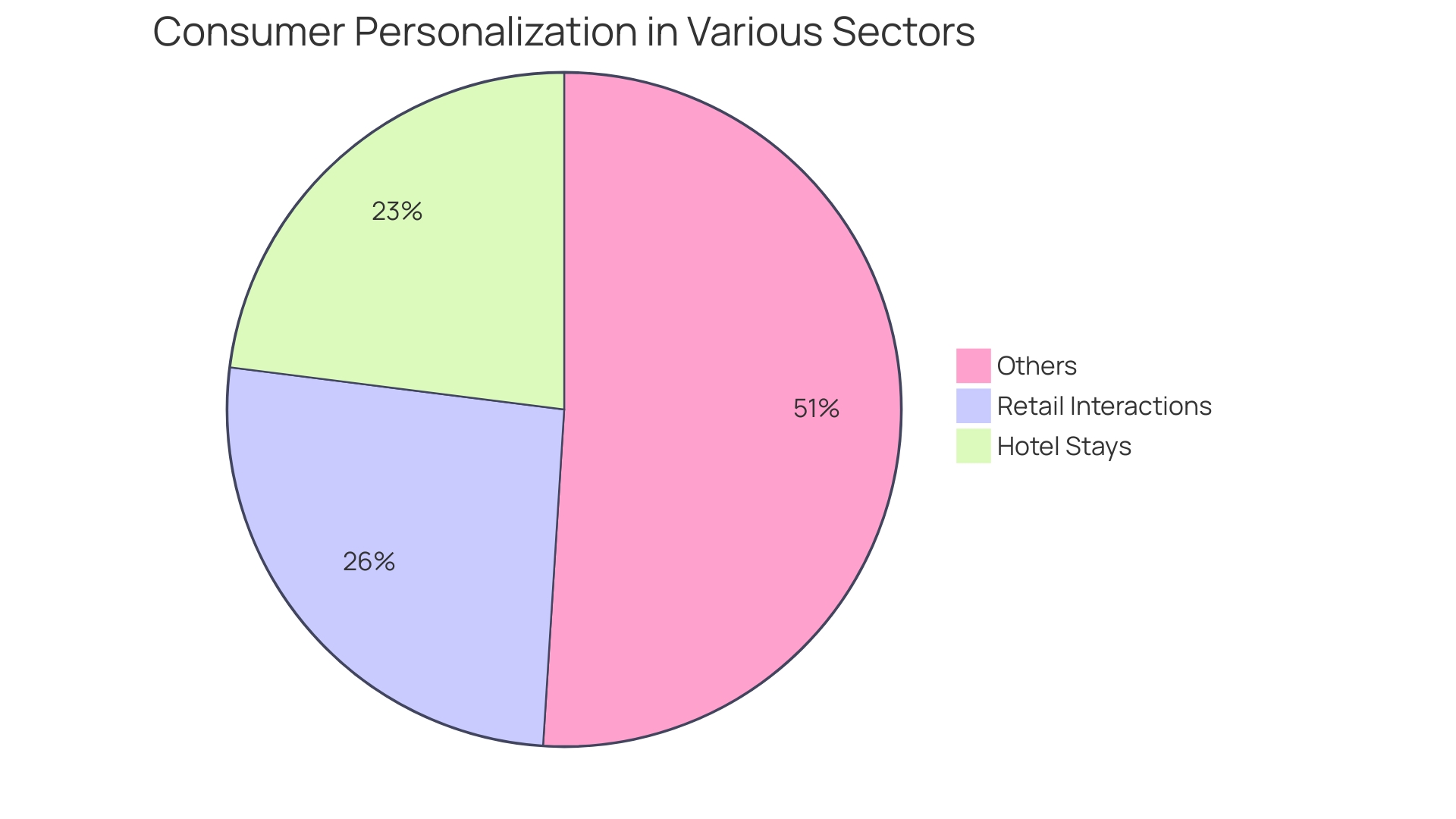
Scaling Customization with Technology
As e-commerce brands expand, scaling customized offerings becomes critical to maintaining a competitive edge. Investing in advanced e-commerce platforms that support extensive personalization features is essential for this growth. Technologies such as 3D modeling and virtual reality allow individuals to visualize customized products instantly, improving their shopping journey. Additionally, automation tools streamline production processes, ensuring timely delivery of customized orders.
Utilizing information science can further enhance the customization experience. By examining client information from various interaction points, brands can acquire insights into buying behaviors and preferences, thus customizing products more efficiently. As emphasized by industry specialists, analytics assists e-commerce merchants in strategically aiming at new and current clients, lowering expenses and improving client satisfaction.
Moreover, integrating AI technologies into the e-commerce ecosystem can significantly boost operational efficiency. AI-driven automation in data pipelines ensures seamless data management, which is crucial for training models that predict consumer behavior and preferences. This method not only enhances decision-making but also aids a scalable personalization strategy that meets the needs of a growing customer base.
The evolving retail landscape, driven by technological advancements, emphasizes the importance of a seamless user experience (UX). Data from integrated platforms provides actionable insights, enabling brands to stay relevant and competitive. By adopting a customer-focused strategy, backed by data analysis and flexible methods, e-commerce brands can manage the intricacies of personalization at scale, ensuring long-term success and growth.
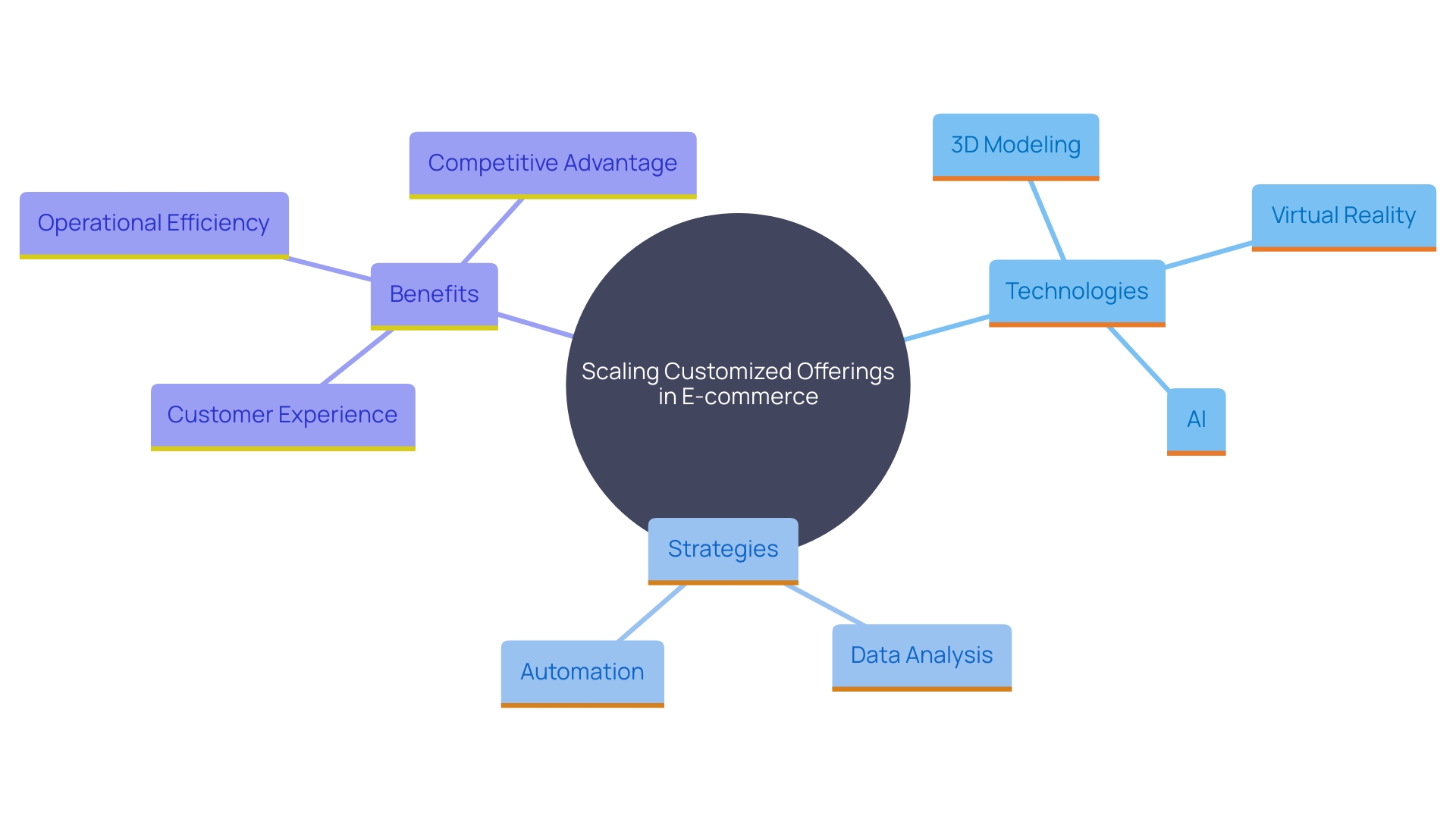
Testing and Refining Customization Options
Ongoing enhancement is vital for efficient product tailoring. Brands should consistently experiment with various personalization options to identify what truly resonates with their audience. Consistently collecting input through client surveys and tracking sales data are crucial actions. This data-driven approach helps determine which features are successful and which need adjustments. For instance, companies like Holiday Extras have embraced a data-driven culture, ensuring all departments, including traditionally qualitative ones like design, become more metrics-oriented. Establishing a feedback loop guarantees that customization options develop in accordance with client preferences, preserving their relevance and attractiveness over time. As highlighted by industry experts, a personalized customer strategy creates a competitive moat that is difficult to replicate.
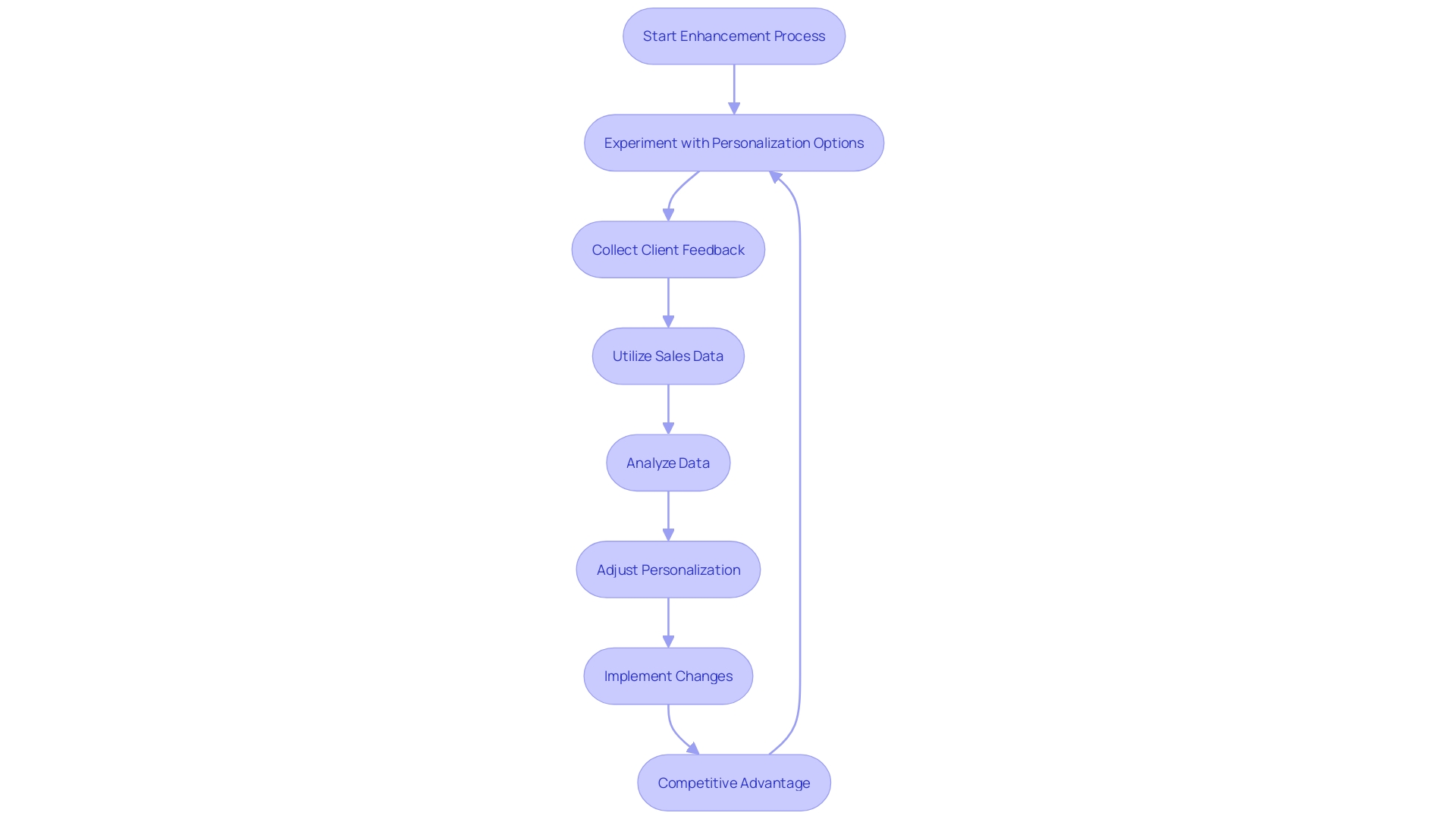
Conclusion
Product customization stands out as a transformative strategy in the e-commerce landscape, offering substantial benefits that extend beyond mere product differentiation. By enhancing customer satisfaction through tailored experiences, brands can cultivate deeper connections with their clientele, leading to increased loyalty and repeat purchases. The ability to command premium prices for customized products not only boosts profitability but also positions brands favorably in a competitive market.
Understanding the target audience is paramount for successful implementation. Comprehensive market research and data-driven insights enable brands to identify consumer preferences and demand for personalization. By leveraging advanced analytics and AI, businesses can streamline their customization processes, ensuring that offerings align closely with customer expectations.
This focus on data not only enhances user experience but also drives operational efficiency, allowing brands to adapt swiftly to evolving market trends.
Moreover, the integration of technology is crucial for scaling customization efforts. Innovations such as 3D modeling and AI-driven automation facilitate real-time personalization, enhancing the shopping experience and ensuring timely delivery of customized products. Continuous testing and refinement of customization options further ensure that brands stay relevant and responsive to customer needs, fostering a culture of improvement that is vital for long-term success.
In conclusion, the strategic adoption of product customization, underpinned by a deep understanding of customer preferences and advanced technology, can significantly enhance brand loyalty and competitiveness in the e-commerce sector. Brands that prioritize personalization and remain agile in their approach will not only meet but exceed customer expectations, securing a lasting advantage in an ever-evolving market.





